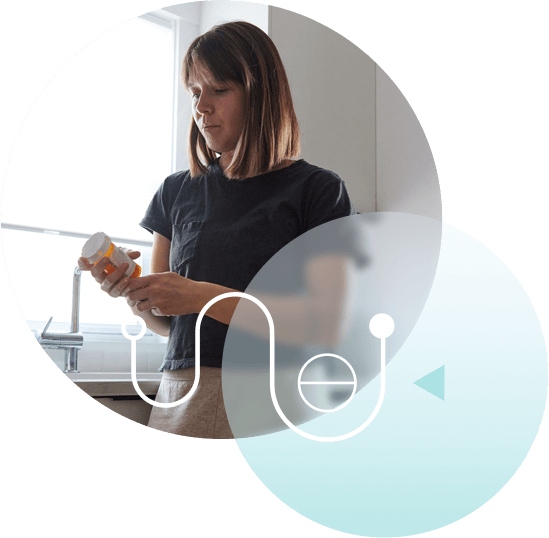PRESCRIPTION MEDICATION
Geodon (generic)
type of medication:
Geodon is a commonly prescribed medication (atypical antipsychotic) that’s often well-tolerated and effective.
Treatment for:
Bipolar

PRESCRIPTION MEDICATION
type of medication:
Geodon is a commonly prescribed medication (atypical antipsychotic) that’s often well-tolerated and effective.
Treatment for:
Bipolar

We offer affordable care for everyone and accept most major insurance, including Medicare and Medicaid.
Learn more






Geodon (ziprasidone)


Mimi Winsberg, MD
Chief Medical Officer, Brightside Health
Stanford-trained psychiatrist with 25 years of practice
At Brightside Health, our psychiatric providers specialize in finding the right medication for your specific needs. As part of your treatment, your provider may recommend Geodon. They’ll go over how the medication works, and answer any questions you may have.
In the meantime, we’ve provided some general information about this medication below. If you have any further questions, please feel free to contact us at [email protected].
Geodon (ziprasidone) is an antipsychotic medication first approved for usage in the United States in 2001. It is commonly prescribed to treat symptoms of schizophrenia, including delusions and hallucinations. It can also help treat manic or mixed-manic/depressive episodes in patients with bipolar disorder. Geodon (ziprasidone) works by managing dopamine and serotonin levels in the brain to regulate thinking and behavior.
At Brightside, our psychiatric providers specialize in personalizing treatment for each person. We give you personal attention and expert advice you can count. By using our expertise, we’ll help you find the medication that’s right for you. It’s important that you understand how medications work and what to expect so that your treatment is worry-free.
Our providers use Geodon (ziprasidone) primarily to treat symptoms of depression associated with bipolar disorder.
Geodon (ziprasidone) can target and treat several indicators of bipolar disorder. We use this medication to treat a number of symptoms, including:
At Brightside, we can help you find the right medication and the right treatment specific to your needs. Your age, gender, genetic background, and other variables–including other medications you may be taking–can affect how well you respond to a certain medication.
To ensure that your medication is a fit for your personal health situation, our psychiatric providers will get to know your individual health history and talk with you about your symptoms and specific health needs.
You can expect to see an improvement in your depression or bipolar symptoms within 4-6 weeks after beginning Geodon (ziprasidone). We understand that this can feel like a long time, but it’s important to continue taking your medication even if you don’t feel improvement right away. In some cases, your provider may need to adjust your dosage for you to get the maximum benefit from the medication. At Brightside, our board-certified providers will closely monitor your progress to make sure this medication and dosage is right for you.
We know that mental health concerns often can’t wait, so if you need to meet with a provider right away to discuss a new or existing medication, just let us know. We’re here for you.
Once your provider prescribes Geodon (ziprasidone) for you, you may have questions – including how long you’ll need to take it. The length of time you’ll take this medication depends on your diagnosis and specific symptoms. You’ll likely continue taking this medication until your provider advises you to stop based on conversations with you and evaluations of your progress.
While there isn’t a specific amount of time Geodon (ziprasidone) is usually taken for, it’s essential to keep taking it even after you begin feeling better. Also, it’s a good idea to speak with your Brightside provider before you stop taking the medication, as they will work with you to adjust the dosage or treatment altogether.
Geodon (ziprasidone) is approved by the US Food and Drug Administration for the acute treatment of psychosis in schizophrenia and mania in bipolar disorder. Data suggest that Geodon (ziprasidone) may be a first-line treatment for patients with bipolar mania.
Research has shown Geodon (ziprasidone) to be effective in the long-term treatment of schizophrenia and schizoaffective disorder.
Antipsychotic medications do not change your personality. Instead, they work to fight symptoms of bipolar disorder, including hallucinations, delusions, and manic episodes, so that you can get back to feeling more like yourself.
Geodon (ziprasidone) can cause minor side effects in some people. These include:
Some patients using Geodon (ziprasidone) have developed tardive dyskinesia, a potentially permanent side effect that can cause involuntary muscle movement. More rarely, Geodon (ziprasidone) has been associated with a serious side effect called neuroleptic malignant syndrome, marked by an irregular heartbeat, high fever, and severe muscle stiffness.
Contact your Brightside provider right away if you experience any of the following symptoms:
At Brightside, your health and safety are our highest priorities. We make sure you get individual attention and guidance to make sure you feel your best.
You should not stop taking Geodon (ziprasidone) – or any antipsychotic medication – abruptly. Stopping Geodon (ziprasidone) suddenly can lead to a relapse of psychotic symptoms, including hallucinations, delusions, or manic episodes.
Quitting an antipsychotic medication abruptly can lead to an increased risk of suicide or self-harm. Sudden antipsychotic withdrawal has also been linked to the development of side effects, including muscle and motor control issues. If you wish to change your medication, you should plan to stop using Geodon (ziprasidone) slowly – gradually reducing your dosage under the close monitoring of one of our providers.
Geodon (ziprasidone) is categorized as a Pregnancy Category Class C drug by the FDA. This classification means that while extensive research on pregnant women has not been done, research using animals suggests that Geodon (ziprasidone) could potentially negatively impact a developing baby.
If you are pregnant or plan to become pregnant, you’ll want to talk with your provider to weigh the benefits and risks of beginning a Geodon (ziprasidone) prescription.
If you already use Geodon (ziprasidone), discuss your case with your provider to see if the benefits of continuing with Geodon (ziprasidone) during pregnancy outweigh any potential risks to your baby. Because there has been little research on the safety of Geodon (ziprasidone) for nursing mothers, the National Center for Biotechnology Information suggests that other forms of antipsychotic medications may be preferred for lactating women.
Geodon (ziprasidone) is generally considered non-addictive and is not habit-forming.
You can view the FDA black box warning for Geodon (ziprasidone) here. If you have questions about whether the black box warning for Geodon (ziprasidone) applies to you, please talk to your provider.
GETTING STARTED WITH BRIGHTSIDE
Start your journey towards life-changing care in a matter of minutes. You’ll receive compassionate support and expert advice the entire way.
Complete a quick questionnaire, then connect 1:1 with your dedicated provider to discuss your needs.
Your provider will pinpoint the most effective medication for you and send it to your pharmacy of choice.
Weekly check-ins help you keep track of symptoms, giving your provider data to make adjustments.
Watch your scores and well-being improve along the way with our Proactive Progress Tracking tool.
OUR PSYCHIATRY plans
Because quality mental health care shouldn’t be out of reach for anyone.
PERSONALIZED
Pay with insurance
or $95/month
comprehensive
Pay with insurance
or $349/month
We accept insurance.





“I feel MUCH IMPROVED! My medication works well for me, and the personal care I have received has been wonderful! My provider listens to me with understanding and compassion.”
Tonya T
“5/5. My provider is excellent and takes time to understand my symptoms and make informed medication determinations. After many years of being on multiple medications, I am feeling much relief after less than two months of treatment.”
Anonymous
“Happier than I have been in years. One of the best decisions of my life was trying Brightside.”
Michael P
“I was impressed with how fast I was able to get an appointment as the wait in my area is months long. I received helpful medication quickly, which is also hard to get here. My provider is terrific, helpful, and kind. The zoom appointments are great for my hectic life. Really love this program so far!”
Anna W
“Very easy and simple to get the medication I needed. Since starting to use Brightside, I have begun to feel so much better about myself and I wake up every day with a sense of excitement that wasn’t there before!”
Brandon D
“It is so convenient to get medication and a therapist that work with my schedule. The quality of care is beyond top notch, and being able to see someone on Sundays is so convenient for people who work during the week.”
Anonymous
“I feel MUCH IMPROVED! My medication works well for me, and the personal care I have received has been wonderful! My provider listens to me with understanding and compassion.”
Tonya T
“5/5. My provider is excellent and takes time to understand my symptoms and make informed medication determinations. After many years of being on multiple medications, I am feeling much relief after less than two months of treatment.”
Anonymous
“Happier than I have been in years. One of the best decisions of my life was trying Brightside.”
Michael P
“I was impressed with how fast I was able to get an appointment as the wait in my area is months long. I received helpful medication quickly, which is also hard to get here. My provider is terrific, helpful, and kind. The zoom appointments are great for my hectic life. Really love this program so far!”
Anna W
“Very easy and simple to get the medication I needed. Since starting to use Brightside, I have begun to feel so much better about myself and I wake up every day with a sense of excitement that wasn’t there before!”
Brandon D
“It is so convenient to get medication and a therapist that work with my schedule. The quality of care is beyond top notch, and being able to see someone on Sundays is so convenient for people who work during the week.”
Anonymous